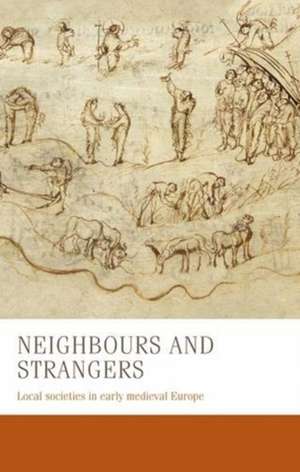Neighbours and Strangers: Manchester Medieval Studies
Autor Miriam (Akademische Oberratin im Hochschuldienst (senior lecturer)) Czocken Limba Engleză Hardback – 12 mar 2020
Din seria Manchester Medieval Studies
-
 Preț: 154.11 lei
Preț: 154.11 lei -
 Preț: 192.05 lei
Preț: 192.05 lei -
 Preț: 206.25 lei
Preț: 206.25 lei -
 Preț: 154.27 lei
Preț: 154.27 lei -
 Preț: 206.79 lei
Preț: 206.79 lei -
 Preț: 214.64 lei
Preț: 214.64 lei -
 Preț: 207.44 lei
Preț: 207.44 lei -
 Preț: 222.46 lei
Preț: 222.46 lei -
 Preț: 226.51 lei
Preț: 226.51 lei - 23%
 Preț: 721.29 lei
Preț: 721.29 lei - 19%
 Preț: 713.65 lei
Preț: 713.65 lei - 23%
 Preț: 722.03 lei
Preț: 722.03 lei -
 Preț: 286.22 lei
Preț: 286.22 lei -
 Preț: 284.31 lei
Preț: 284.31 lei -
 Preț: 201.85 lei
Preț: 201.85 lei -
 Preț: 284.90 lei
Preț: 284.90 lei -
 Preț: 340.42 lei
Preț: 340.42 lei - 23%
 Preț: 725.00 lei
Preț: 725.00 lei - 23%
 Preț: 778.40 lei
Preț: 778.40 lei
Preț: 722.17 lei
Preț vechi: 937.88 lei
-23% Nou
Puncte Express: 1083
Preț estimativ în valută:
138.21€ • 143.75$ • 114.10£
138.21€ • 143.75$ • 114.10£
Carte tipărită la comandă
Livrare economică 15-29 aprilie
Preluare comenzi: 021 569.72.76
Specificații
ISBN-13: 9781526139818
ISBN-10: 1526139812
Pagini: 320
Dimensiuni: 138 x 216 x 26 mm
Greutate: 0.5 kg
Editura: MANCHESTER UNIVERSITY PRESS
Seria Manchester Medieval Studies
ISBN-10: 1526139812
Pagini: 320
Dimensiuni: 138 x 216 x 26 mm
Greutate: 0.5 kg
Editura: MANCHESTER UNIVERSITY PRESS
Seria Manchester Medieval Studies
Descriere
This book explores rural societies in western Europe from 700-1050. It focuses on the bottom of the social hierarchy, rejectingviews that see rural society exclusively through the structures of lordship and challenging the teleological idea of the residential group as the prototype of the late-medieval structured community. -- .
